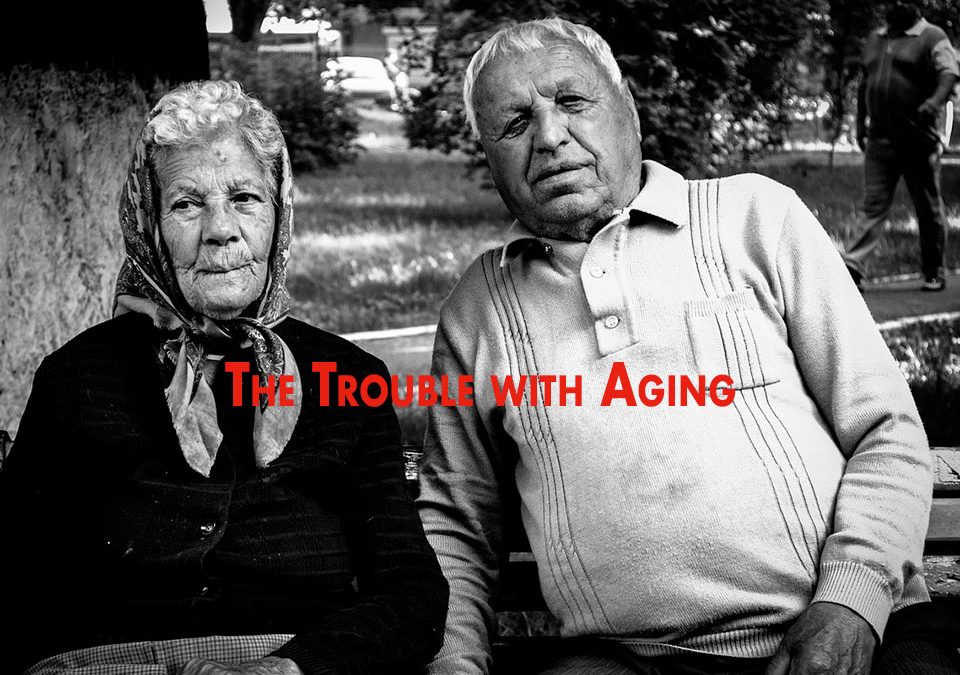The Trouble with Aging
Over the last two weeks, we have been considering what I call the “8 Ds of Aging”—eight different struggles we experience as we age, progressing through this journey called life in a fallen world.
They are: Dissatisfaction, Disorientation, Discouragement, Dread, Disappointment, Disinterest, Distance, and Distraction.
Each of these struggles will present uniquely, depending on the individual. We may experience them at different times, or simultaneously, for various reasons. But they all have common threads that run through them.
I want to consider what creates and causes these unique challenges—perhaps even leading to crisis—as we approach midlife and beyond. Most importantly, I want to help prepare our hearts to respond biblically to the inevitable difficulty.
Remember, it’s first and foremost the struggles inside us that cause us to struggle with the struggles outside us. We will trouble our own trouble because of how we respond unbiblically to the trouble that comes with aging.
So, what causes trouble with age? I will cover three this week and two more next.
1. Unexpected Events
There is a way in which we don’t live our life, but our life lives us. We get carried along by its locations, relationships, situations, responsibilities, opportunities, and activities without stopping to look, listen, and consider.
Huge chunks of time can pass virtually unnoticed. Then we experience some unexpected event that suddenly opens our eyes. People who study these things call them trigger events, and often, because of our environment (a fallen world living among broken people), these trigger events are full of suffering, grief, and trouble.
2. New Awareness
Because trigger events open our eyes, we now begin to see and feel things that were probably already there, but in the busyness of life, didn’t get the attention they deserve.
Maybe we suddenly realize how much time has passed and how little we have accomplished compared to our youthful dreams. Perhaps we now see how several decisions along the way have set the course of our lives.
We may become newly aware of our physical health and the realities of aging. Perhaps we now suddenly perceive significant differences between our lives and those of others around us.
3. Foolish Interpretations
Human beings are interpreters. Made in the image of God, we live our lives based not on the facts of our experiences, but on our unique interpretations of those facts. Growing awareness of age, or a severe midlife crisis, is about more than just an unexpected event followed by powerful new awareness. The trouble is truly rooted in the way we interpret the age or crisis we are now experiencing.
Even though with age comes life experience and wisdom, in ways we don’t notice, sin still has the power to reduce all of us to fools. Until we are on the other side of eternity, even the oldest Christian can still be susceptible to foolishness.
Proverbs 14:12 says, “There is a way that seems right to a man, but its end is the way to death.” As sinners, the problem with our interpretations is that they tend to be narrow and selective. That is why we all need the wise perspectives of God’s Word and the wisdom found in the honesty of the body of Christ.
Getting older or experiencing any crisis that may come with aging is deeply theological, far more than they are merely physical or circumstantial. It all balances on the fundamental ways we make sense out of life. It’s all about how our functional systems of belief shape the way we respond to whatever God puts on our plate.
Therefore, we must continually carry two commitments with us wherever we go. First, we need to commit to being persistent and teachable students of God’s Word. We were never designed to figure out life on our own. Only as we submit to the wisdom of the Wonderful Counselor will we escape the hold of our own foolishness.
Second, we need to be committed to a habit of ongoing self-examination. You and I need to discipline ourselves in the practice of standing before the mirror of the Word of God (which includes allowing others to hold that mirror in front of us) so that we can see ourselves as we really are.
Becoming an older, wiser, and mature Christian is found at the intersection of accurate self-knowledge and the true knowledge of God.
A Prayer for Today: God, the challenge of aging can be overwhelming and sad for me sometimes. Being faced with my limitations as the days fly by can be unexpected, new, and difficult to interpret, but from a position of need, I’m crying out to you for grace. Would you give me the grace I need to face each new day as an opportunity to become wiser and more mature as a Christian? Help me to know myself more accurately and know you more intimately as time moves forward. I want more of you every moment. In Jesus’ name, amen.
Discussion Prompt for Children
1. Why do you think adults sometimes feel afraid of getting older? How can getting older be a good thing, especially for someone who’s a Christian?
2. Can you tell me what wisdom is? How does someone get wisdom? Why are older people usually the only ones we say have wisdom?
3. What does it mean to be mature? What’s the difference between regular maturity and Christian maturity?
4. What is special about growing in wisdom and maturity?
Reflection Questions
1. In what ways have you struggled with getting older and how has it been a source of discouragement for you? How have unexpected events, new awareness, and your own foolish interpretations negatively impacted your daily life?
2. If you were to narrow down your description of getting older into one or two sentences, how would you write out your interpretation of your life stage right now? Take the time now to write out those sentences.
3. How have you seen your personal study of God’s Word impact the way you live each day? In what ways can you make more time for study of the Scriptures?
4. Who in your life would you trust to hold up a mirror for you and help to guide you on the path of godliness more and more as you get older? What is your plan for habitual self-examination in a way that leads to greater and greater sanctification?

